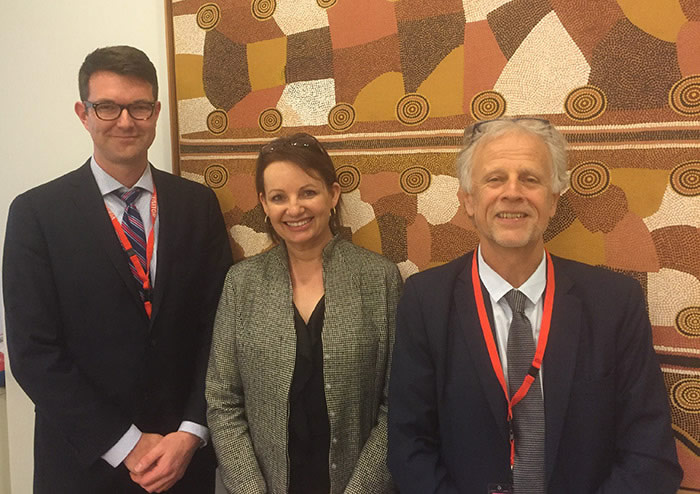Future of healthcare discussed in Canberra
The future of Australia’s healthcare system, and the critical and evolving role of general practice being central in any health dialogue, were re-enforced when RACGP President-elect Dr Bastian Seidel and I met with Federal Minister Sussan Ley at her office in Parliament House on Wednesday.

(Image of Dr Jones and Dr Seidel with Minister Ley in Canberra on Wednesday)
The conversation was generally positive and productive, and reflected the RACGP position on the key issues that affect our patients and our practices. The Minister recognised the primacy of general practice and how integral it is to our patients and the healthcare economy.
There was a recognition of the need for a seismic shift in how healthcare is organised and delivered in Australia, with a need for cultural and structural changes in terms of how patients receive care.
The RACGP’s ‘post-election priorities for health’ action plan provided the basis of the discussion. Specific items covered included:
- lifting the Medicare Benefits Schedule (MBS) freeze for general practice patient rebates only
- the MBS Review and its potential cost savings and, by implication, investing those dollars into primary care, the most cost-efficient use of the health currency
- changing bulk-billing rules to allow GPs to bulk-bill a patient and charge a gap fee on the same day
- the importance of a ‘patient-centred medical home’ model, which needs appropriate funding for design, implementation and evaluation.
The Minister acknowledged our expertise and welcomed our input on these key issues going forward.
Dr Seidel and I outlined to the Minister recent overseas research that re-enforced the RACGP’s long-standing position that having a regular GP improves overall patient outcomes and is cost-efficient to a country’s health system.
There was a mutual understanding of the critical issues and the constructive dialogue will continue.
Minister Ley was formally invited to attend the upcoming GP16 in Perth, with the aim of a providing the RACGP with her vision for GP-led care in the 21st century.
Frank R Jones
President RACGP
My Aged Care referrals – updated information now online
The Department of Health (DoH) has outlined its next steps in supporting GPs when referring patients to My Aged Care. This is part of the DoH’s vision for how health professionals access and interact with the service, providing older patients and Aboriginal and Torres Strait Islander peoples with more choice, greater control and easier access to a full range of aged care services.
A revised web-form will continue to enhance My Aged Care and referral pathways to facilitate faster and more efficient outcomes for patients.
For more information download the factsheet.
Changes to public disclosure of payments to healthcare professionals
Pharmaceutical companies (that are members of Medicines Australia) are now required to publish information about payments and transfers of value made to individual healthcare professionals. The first reports of this information will be published on company websites from 31 August. This is a positive move towards greater transparency and will help strengthen the wider community’s understanding and trust in the pharmaceutical industry and in healthcare professionals.
The information will relate to two main categories:
- Payments for the provision of services (eg, giving a lecture, chairing an educational meeting, providing advice as a member of an advisory board or as a consultant).
- Airfares and/or accommodation associated with medical education or providing a service and conference registration fees.
Visit the Medicines Australia website.
Convocation voting and comments now open
The RACGP has received two item submissions from members for Convocation, which will be held during GP16 in Perth, on Friday 30 September.
Convocation is an opportunity for RACGP members to raise matters of importance with other members and inform Council about issues GPs consider significant. Resolutions passed by Convocation are not binding for Council; however, all items passed by Convocation will be considered.
Members have the opportunity to vote and comment on the two submissions until 4.00 pm (AEST), Friday 19 August.
Clinical pearl 1
Symptoms of possible dementia should be explored when first raised and should not be dismissed as ‘part of ageing’
Clinical cognitive assessment in those with suspected dementia should include an examination using a questionnaire with established reliability, validity and with consideration of the particular patient demographic, such as age, literacy, and culture.
A number of cognitive assessment tools are suitable for use in general practice:
- The Mini Mental State Exam (MMSE) is the most commonly used.
- The General Practitioner Assessment of Cognition (GPCOG) was developed in Australia specifically for use with older people visiting their GP.
- The Rowland Universal Dementia Assessment Scale (RUDAS) was also developed in Australia and is suitable for use with culturally and linguistically diverse populations.
- The Kimberley Indigenous Cognitive Assessment (KICA) is a culturally appropriate tool for use with remote-living Aboriginal and Torres Strait Islander peoples.
Visit the National Clinical Practice Guidelines for Dementia in Australia for more information. These guidelines were recently approved by the RACGP as an Accepted Clinical Resource.
In Practice Poll question – Standards patient feedback
The RACGP is currently consulting with all stakeholders on the development of the 5th edition Standards for general practices (5th edition Standards). The current draft is available to download from the Standards development page.
The 5th edition Standards’ indicators have been written with a focus on outcomes and patients, including the proposed patient feedback indicators which provide increased flexibility for practices in obtaining feedback from their patients.
Collecting and responding to patient feedback has been shown to improve clinical effectiveness and patient safety, adherence to recommended medication and treatments, and preventive care. Patients appreciate knowing that their feedback is taken seriously and acted on where possible.
To assist the RACGP’s continued development of these indicators and the accompanying patient feedback guide, we are seeking your opinion on the most appropriate method for patient feedback collection for your practice.